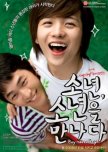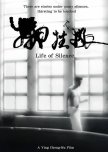
A story of healing, love and the fusion of two opposite worlds
No one can resist the charm and cuteness of pets; Regardless of whether it is a parrot, rabbit, dog or kitten, they win your heart and little by little they end up being part of the family. Most human beings enjoy spending time with their pet, which is not surprising since while you indulge in the moment, your brain feels happy and secretes "the happiness hormone."'Love is Like a Cat' (사랑은 고양이처럼), also known as 'Sarangeun Goyang Icheoleom', the romantic comedy from South Korean director Kwon Nam Ki ((권남기), revolves around Piuno (Mew Suppasit - 'What The Duck ', 'TharnType' and 'TharnType2: 7 Years Of Love'), a well-known Thai star who doesn't like animals, and her romance with Lee Dae Byeol (Chu Jimin, known as JM, from the South Korean idol group JUST B), the director of a pet daycare.
Every time he crosses paths with an animal, Piuno remembers a traumatic episode he experienced in his childhood that makes him not want them around. Pets do not awaken that feeling of love or tenderness in him. He suffers from zoophobia. He is aware that this phobia is considered an irrational act of human beings, but he cannot help it.
It has been suggested to him that his "illness" can be treated with professional help, since he can find the necessary support to overcome the trauma and gradually manage to coexist with the animals. But he has not paid interest to the matter, thinking that it would not be of much use to him, and he has moved on with his life.
However, when he finds himself threatened by those who wish to see him brought down, there is only one thing he can do to save his reputation and his career: work at a pet daycare in South Korea.
Putting aside his severe dislike for animals, Piuno begins working alongside Dae Byeol, who will help him find ways to overcome the trauma that first inspired his hatred of animals. This is how he will end up appearing in a reality show set in a pet cafe in Seoul.
But these will not be the only surprises that the protagonist encounters: as his heart begins to soften, unexpected feelings begin to arise for the young owner of the daycare center. What will happen between the cold and enigmatic actor who doesn't believe in love, and the outgoing and romantic pet daycare owner when their lives intersect?
Lovers of the BL genre in general, and of Mew Suppasit, in particular, will be pleased with the reappearance of the renowned Thai actor, singer and producer in a romance drama between two boys of the same sex. On the other hand, JM, his co-star, shows his youthful charms and the dreamy aura of the idol, as well as his talent as an actor, in this, his first appearance in a drama.
In addition to the aforementioned actors, on screen we will see GeonU, also a member of JUST B, also in his acting debut, playing Gi Min, one of the pet daycare workers; and Kim Kyoung Seok ('Hot And Sweet' and 'Someday Office'), as Jun Hyuk, a friend of Dae Byeol and one of his biggest followers. These secondary characters play a very important role and contribute intensity and complexity to the conflicts.
With a seductive cast, in addition to wonderful chemistry, the direction, cinematography, writing, music and staging transport the viewer to a dream and fairy tale universe in which everyone involved, including the Animals, especially dogs, contribute their own, to achieve a series capable of marking a milestone within the genre, as it escapes stereotypes, and shows human beings with their nuances and in various circumstances. The narrative maintains a good rhythm that enhances the emotional closure of each episode and the series in general.
All these details give an idea of the story told to those who still do not know it, a narrative firmly based on the love stories between two young men of different personalities, countries, professions, languages and cultures, but determined to sustain their idyll against all obstacles. , prejudices and cultural, linguistic or temperament divergences. One looks like a dog, while the other looks like a cat.
What an actor lacks because he is new to these issues, the other provides, due to his extensive experience. It's fascinating to watch the couple navigate their uncertain feelings. One of the main reasons audiences will admire the series is the simplicity and relatability of the story, as well as the good visuals.
Although slow, the romance gradually intensifies, allowing 'Love is Like a Cat' to show one of its greatest strengths. With the ability to create many tender moments between the two young people, I would like to see them flirt in the garden of the animal nursery and kiss in the sunny corner of the clinic room, under the knowing gaze of their friends, including those of four paws.
Every affectionate interaction, through beautifully polished images, would be appreciated by the BL fanatic public.
Dae Byeol is a well-defined protagonist. He knows his work and loves animals. He is sincere, responsible and faithful to his friends, both those who bark and the others who accompany him on this journey of taking care of pets and falling in love with a famous television star. His qualities create a memorable character with nuances. His charm emerges once the performer gains confidence in the role he plays. Just then the couple's chemistry strengthens, going from being a little embarrassing at first to building a more comfortable and deeper relationship.
In comparison, Piuno's backstory will also draw the viewer's sympathy with high marks. He likes it more and more, especially when he overcomes the somewhat mysterious, reserved, fearful attitude when encountering the animals for which he has always felt rejection, when leaving behind the weight of the circumstances that forced him to move away from his comfort zone, and when you begin to adapt to the people, the language, the customs, the culture of a foreign country.
The series explores the couple's bond physically, emotionally and spiritually. When I think about how Piuno and Lee Dae Byeol started the story of "strangers to friends and friends to lovers", both of them, side by side, went on an eventful journey. They overcame personality clashes, misunderstandings, and even cultural and language differences. Best of all, there's a lot of cute BL content.
One of the strong and striking points of the series is the fusion of two worlds. Piuno and Dae Byeol come from two different countries and cultures. Their universes will collide when their paths cross. Everything that separates them will not be an impediment for the two main characters to get closer, fall in love and begin a journey in search of happiness.
Each episode aims to ensure that the viewer is not disappointed, that they remain hooked, that they have a closure that lives up to expectations. The technical and artistic teams worked to achieve it. The arc of the characters, their development, as well as the events and conflicts, are very coherent.
The script, the depth of the themes addressed, and the aesthetics with which they are presented, the attention to detail to be as realistic as possible, the convincing performances, with a cast made up of established and young actors and actresses, determine, among others , the elements that mark the success of 'Love is Like a Cat'.
'Love is Like a Cat' is a story of healing and love. In addition to the entertainment factor and the fun and tender interactions between Piuno and Lee Dae Byeol, the series tells a story about overcoming trauma, opening your heart, and falling in love.
The inclusion of the adorable animals will provoke a positive reaction from pet lovers and the general public.
This is one of the four joint Thai-Korean BL projects from Hanyang Studio, from the same WeTV Original production, 'Peach Of Time'. The remaining dramas are 'Eccentric Romance', 'Wuju Bakery' and 'The First Love Manual', scheduled to premiere in 2024.
This collaboration between the two countries demonstrates once again that BL series defend the correct formula to sustain and consolidate the genre with the aim of satisfying an audience that craves authentic and moving love stories.
Personally, I liked the way the plot was executed, subtly exploring the characters' personal stories.
This romantic comedy is designed and taken from the script to the images with the potential audience being fans of the romantic genre in general, since love is universal and knows no genres, as well as fans of romances between boys in particular, and makes it clear that its objective is to portray love, acceptance, self-discovery, sexual diversity, the search for happiness, the influence of reality shows on viewers, the perception of the image of actors and idols by the public. , the pressures of the entertainment industry on artists, the challenges that come with being a queer person in today's world, themes explored through the dynamics of the characters.
Conceived to move people and involve audiences, through the main story and secondary plots, the series proposes to generate controversy about other dominant, current and universal elements, such as the tumultuous relationship between father and son, the love of animals and how they influence children's behavior, workplace camaraderie, sexual exploration, positivity, self-validation, and maturation issues. There are cultural debates and topics related to veterinary medicine and animal adoption, which helps make all the stories relatable.
Was this review helpful to you?

While Kai asks Jie not to travel to another country as this would mean an immense distance between the two, Jie points out that if Kai becomes a pastor the relationship would also be compromised due to the Catholic Church's opposition to homosexual relationships.
'Icarus' (伊卡洛斯的翅膀 / 'Yi Ka Luo Si De Chi Bang' is a 2017 LGBT+ themed romantic drama, written, directed and edited by filmmaker Alan Chen, which tells us through the characters and their conflicts an authentic myth of our times: that of Icarus, one of the shortest and, at the same time, most complex classical myths.
Produced by Shao-Han Wen and with photography by Meng Chen Hung, the short film tells us that Kai lives trapped with his father, a pastor played by actor Chin-Liang Liao, not on the island of Crete, but in a Taiwanese church. But when he falls in love, Jie is the sun that illuminates his life. However, the more he wants to reach out to his boyfriend, the more he falls into the embrace of the heat.
After Kai learns of his lover's plans, his first reaction is to paint Icarus falling because his wax-glued wings cannot withstand the heat of the sun. When Jie asks him "What did you think about when you drew this?" Kai responds with two questions: "When are you going abroad?" I mean, will our feelings for each other disappear?" It is evident that Kai has come to the conclusion that the path Jie has chosen may result in the end of the existing relationship between the two. But doesn't Kai's decision have the same destructive power?
However, like the story of the myth, the short film leaves us with a variety of interpretations and meanings. These include the one about young people who do not control their impulses and crash immediately, or the one that tells us about an ingenious father and his unfortunate son, both victims of their own ambition.
With Daedalus unable to save his son, many see the story of Icarus as a warning about the dangers of ambition or lack of moderation. Some interpret the story from a more positive perspective, emphasizing the importance of living life fully, even when there are consequences.
Given the backdrop of the Taiwanese Catholic Church, some might take the film text as a metaphor for what can happen to people when they stray from the path of righteousness, assuming that the Church represents this.
Others see Icarus as a symbol of punished youthful recklessness, or the symbol of the rebellion of young people with respect to their parents, but also as a symbol of the innate curiosity of youth, the attraction of risk, the pleasure of adventure, of the interest in learning, of the fever to rise to the top.
Was this review helpful to you?

Created to be featured on the variety show "Gozen 0ji no Mori"
'Nekutai magatteru yo', which in English would be translated as "Your necktie is crooked", by Japanese director Ikeda Ayano, is a Thai-Japanese BL short film starring Perth Nakhun Screaigh as Rokko, and Lay Talay Sanguandikul as Ratanapol.The film marks the return after four years of two of the actors who first participated as a couple in the 2020 Thai BL drama 'My Engineer', playing Ram and King, respectively.
The short film, just 7 minutes long, was created with the purpose of being presented in the variety program "Gozen 0ji no Mori" (Midnight Forest). It is a one-hour Japanese television interview program in which participants talk about a wide variety of topics that have recently happened in Japan during the Reiwa era, the current era of Japan that began in May 2019.
As assistant director of the program "Gozen 0ji no Mori", Ayano Ikeda conceived the idea of interviewing the two actors visiting Japan under the legend "Reunited in Tokyo", while a short dramatized film aired, without great claims, in which both participated, and which also served as a letter of introduction to the public.
Due to the popularity of BL in Japan, the television space has invited Perth on several occasions to talk about Thai dramas of this genre. Taking advantage of the coincidence of Talay being in that nation, he was also invited to present himself.
The short film also pays a kind of tribute to the culture of the two countries, since the story revolves around two young Thais, one of them an actor (Talay) and the other a translator of the Thai-Japanese languages (Perth). , who separated after having had a romance, because each one took a different path to build a future, and now, six years later, for work reasons, they meet again in Japanese lands and, as they are still in love, they have the opportunity to continue their love relationship.
Was this review helpful to you?

A story of healing, love and the fusion of two opposite worlds
No one can resist the charm and cuteness of pets; Regardless of whether it is a parrot, rabbit, dog or kitten, they win your heart and little by little they end up being part of the family. Most human beings enjoy spending time with their pet, which is not surprising since while you indulge in the moment, your brain feels happy and secretes "the happiness hormone."'Love is Like a Cat' (사랑은 고양이처럼), also known as 'Sarangeun Goyang Icheoleom', the romantic comedy from South Korean director Kwon Nam Ki ((권남기), revolves around Piuno (Mew Suppasit - 'What The Duck ', 'TharnType' and 'TharnType2: 7 Years Of Love'), a well-known Thai star who doesn't like animals, and her romance with Lee Dae Byeol (Chu Jimin, known as JM, from the South Korean idol group JUST B), the director of a pet daycare.
Every time he crosses paths with an animal, Piuno remembers a traumatic episode he experienced in his childhood that makes him not want them around. Pets do not awaken that feeling of love or tenderness in him. He suffers from zoophobia. He is aware that this phobia is considered an irrational act of human beings, but he cannot help it.
It has been suggested to him that his "illness" can be treated with professional help, since he can find the necessary support to overcome the trauma and gradually manage to coexist with the animals. But he has not paid interest to the matter, thinking that it would not be of much use to him, and he has moved on with his life.
However, when he finds himself threatened by those who wish to see him brought down, there is only one thing he can do to save his reputation and his career: work at a pet daycare in South Korea.
Putting aside his severe dislike for animals, Piuno begins working alongside Dae Byeol, who will help him find ways to overcome the trauma that first inspired his hatred of animals. This is how he will end up appearing in a reality show set in a pet cafe in Seoul.
But these will not be the only surprises that the protagonist encounters: as his heart begins to soften, unexpected feelings begin to arise for the young owner of the daycare center. What will happen between the cold and enigmatic actor who doesn't believe in love, and the outgoing and romantic pet daycare owner when their lives intersect?
Lovers of the BL genre in general, and of Mew Suppasit, in particular, will be pleased with the reappearance of the renowned Thai actor, singer and producer in a romance drama between two boys of the same sex. On the other hand, JM, his co-star, shows his youthful charms and the dreamy aura of the idol, as well as his talent as an actor, in this, his first appearance in a drama.
In addition to the aforementioned actors, on screen we will see GeonU, also a member of JUST B, also in his acting debut, playing Gi Min, one of the pet daycare workers; and Kim Kyoung Seok ('Hot And Sweet' and 'Someday Office'), as Jun Hyuk, a friend of Dae Byeol and one of his biggest followers. These secondary characters play a very important role and contribute intensity and complexity to the conflicts.
With a seductive cast, in addition to wonderful chemistry, the direction, cinematography, writing, music and staging transport the viewer to a dream and fairy tale universe in which everyone involved, including the Animals, especially dogs, contribute their own, to achieve a series capable of marking a milestone within the genre, as it escapes stereotypes, and shows human beings with their nuances and in various circumstances. The narrative maintains a good rhythm that enhances the emotional closure of each episode and the series in general.
All these details give an idea of the story told to those who still do not know it, a narrative firmly based on the love stories between two young men of different personalities, countries, professions, languages and cultures, but determined to sustain their idyll against all obstacles. , prejudices and cultural, linguistic or temperament divergences. One looks like a dog, while the other looks like a cat.
What an actor lacks because he is new to these issues, the other provides, due to his extensive experience. It's fascinating to watch the couple navigate their uncertain feelings. One of the main reasons audiences will admire the series is the simplicity and relatability of the story, as well as the good visuals.
Once the romance escalates, 'Love is Like a Cat' shows one of its greatest strengths. The series has the ability to create many tender moments between the two young people. We will see them flirting in the garden of the animal nursery and kissing in the sunny corner of the clinic room, under the knowing gaze of their friends, including the four-legged ones.
Every affectionate interaction is like a treat for BL fans, making these scenes even better thanks to the beautifully polished visuals. The public will witness the generous abundance of romantic images. The cinematographer captures every intimate look and every loving gesture with pinpoint precision.
Dae Byeol is a well-defined protagonist. He knows his work and loves animals. He is sincere, responsible and faithful to his friends, both those who bark and the others who accompany him on this journey of taking care of pets and falling in love with a famous television star. His qualities create a memorable character with nuances. His charm emerges once the performer gains confidence in the role he plays. Just then the couple's chemistry strengthens, going from being a little embarrassing at first to building a more comfortable and deeper relationship.
In comparison, Piuno's backstory will also draw the viewer's sympathy with high marks. He likes it more and more, especially when he overcomes the somewhat mysterious, reserved, fearful attitude when encountering the animals for which he has always felt rejection, when leaving behind the weight of the circumstances that forced him to move away from his comfort zone, and when you begin to adapt to the people, the language, the customs, the culture of a foreign country.
The series explores the couple's bond physically, emotionally and spiritually. When I think about how Piuno and Lee Dae Byeol started the story of "strangers to friends and friends to lovers", both of them, side by side, went on an eventful journey. They overcame personality clashes, misunderstandings, and even cultural and language differences. Best of all, there's a lot of cute BL content.
One of the strong and striking points of the series is the fusion of two worlds. Piuno and Dae Byeol come from two different countries and cultures. Their universes will collide when their paths cross. Everything that separates them will not be an impediment for the two main characters to get closer, fall in love and begin a journey in search of happiness.
Each episode aims to ensure that the viewer is not disappointed, that they remain hooked, that they have a closure that lives up to expectations. The technical and artistic teams worked to achieve it. The arc of the characters, their development, as well as the events and conflicts, are very coherent.
The script, the depth of the themes addressed, and the aesthetics with which they are presented, the attention to detail to be as realistic as possible, the convincing performances, with a cast made up of established and young actors and actresses, determine, among others , the elements that mark the success of 'Love is Like a Cat'.
'Love is Like a Cat' is a story of healing and love. In addition to the entertainment factor and the fun and tender interactions between Piuno and Lee Dae Byeol, the series tells a story about overcoming trauma, opening your heart, and falling in love.
The inclusion of the adorable animals will provoke a positive reaction from pet lovers and the general public.
This is one of the four joint Thai-Korean BL projects from Hanyang Studio, from the same WeTV Original production, 'Peach Of Time'. The remaining dramas are 'Eccentric Romance', 'Wuju Bakery' and 'The First Love Manual', scheduled to premiere in 2024.
This collaboration between the two countries demonstrates once again that BL series defend the correct formula to sustain and consolidate the genre with the aim of satisfying an audience that craves authentic and moving love stories.
Personally, I liked the way the plot was executed, subtly exploring the characters' personal stories.
This romantic comedy is designed and taken from the script to the images with the potential audience being fans of the romantic genre in general, since love is universal and knows no genres, as well as fans of romances between boys in particular, and makes it clear that its objective is to portray love, acceptance, self-discovery, sexual diversity, the search for happiness, the influence of reality shows on viewers, the perception of the image of actors and idols by the public. , the pressures of the entertainment industry on artists, the challenges that come with being a queer person in today's world, themes explored through the dynamics of the characters.
Conceived to move people and involve audiences, through the main story and secondary plots, the series proposes to generate controversy about other dominant, current and universal elements, such as the tumultuous relationship between father and son, the love of animals and how they influence children's behavior, workplace camaraderie, sexual exploration, positivity, self-validation, and maturation issues. There are cultural debates and topics related to veterinary medicine and animal adoption, which helps make all the stories relatable.
Was this review helpful to you?

Look for safe sex and a decent chat. Through a gay dating app, he has scheduled to meet Vince, the attractive and discreet neighbor, but the sexual encounter is interrupted by the unexpected arrival of his parents, and before them he will once again restrain his deepest but most difficult desire: "come out of the closet."
However, Dino cannot prevent the brand new dildo from being seen by his mother.
Vince is willing to wait. The wait is worth it: a friendly relationship begins to emerge between the two that may very well lead to something more.
With solid performances, a beautiful script, magnificent camera work and charming surroundings, the short film 'This Is Not A Coming Out Story' (2022), by Filipino filmmaker Mark Felix Ebreo, brings us fun moments and an irresistible visual chemistry of its two protagonists: Dino, played by AJ Sison, known for his role in 'U-Turn (2020)', 'Dito at doon' (2021) and 'Love in the Ungodly Hour' (2021) and Vince, a character assumed by Jel Tarun, actor known for his role in 'Silent Cries' (2023).
The short film also tells us about homophobia.
The soundtrack fits perfectly with the film story.
With a script by Mark Felix Ebreo himself, the cast closes with the performances of Jun Nayra, known for his performance in 'Bonifacio: Ang unang pangulo' (2014), 'Darna' (2022) and 'Sandwich' (2023), and Gigi Hernandez, known for her role in 'Sandwich' (2023), 'Ikigai: Life Is a Beautiful Ride' (2023) and 'Alapaap' (2022), playing Jerome and Liz, Dino's father and mother, respectively.
Committed to bringing queer narratives to spaces to increase the visibility of the stories of people who have not yet discovered their true identity, Mark Felix Ebreo won with this short film the Best Director award at the 1st Pelikulaya LGBTQIA+ International Film Festival, as well as a Honorable Mention in the Short Fiction category at the 34th CCP Gawad Alternatibo.
Additionally, 'This Is Not A Coming Out Story' won the Cardinal Gold Award with the highest honor, as well as the award for best screenplay at the 20th CineMapua International Student Film Festival.
Was this review helpful to you?

This review may contain spoilers
The fear and insecurity that homosexuals suffer in an intolerant and homophobic country
The third short film by Kim-Jho Gwang-Soo (김조광수) takes up Min Soo, the character created by him and first introduced in 'Boy Meets Boy', in 2008, and later in 'Just Friend?', the following year, for tell us about the most recurrent film themes and objectives of this renowned South Korean film director and screenwriter: sexual awakening, coming of age, sexuality, gender identity, being queer in a heteronormative and homophobic society.But in this film, the filmmaker introduces other topics, such as sexual desire, bullying, the problems of homosexuals facing a homophobic society, the fear of homophobia. The final scene is quite devastating with the Irish song Danny Boy.
Peter Kim, nickname by which this filmmaker is also known, seeks to illustrate in 'Love 100° C' (사랑은 100℃ / Sarangeun 100℃), the desires and dangers that homosexuals face in South Korean society through a hearing-impaired gay teenager named Min Soo. From the first scene we are introduced to the teenager, while he masturbates with photographs of his classmate Ji Seok, a supposedly heterosexual, homophobic person, of course, whom he secretly loves.
Despite his deafness, Min Soo is a self-aware young man. He suffers from bullying from his classmates not because he is gay but because of his hearing problem, since the other high school students confuse the condition with an impairment in his brain. For the same reason, his brother, a year younger, also bothers him. Min Soo needs a hearing aid, but he can read people's lips if they talk to him correctly.
It is probably not difficult to imagine that he would also suffer homophobic attacks if his sexual orientation were discovered.
Min Soo's life changes when one day a young and attractive masseuse from a bathhouse he frequently visits begins to flirt with our protagonist. For the first time in his short existence, Min Soo receives kind and respectful treatment from a person who is not his mother, the only one who thinks he does not have a mental deficiency.
The handsome bathhouse worker treats him as an equal and offers him a free massage. Next comes a beautiful scene between the two boys communicating through whistles and applause to the beat of the background music of the short film itself.
The shot of Min Soo swinging his legs between the masseuse's crotch, one sitting on the bed where he will receive the massage and the other standing before him, is moving.
Kim Jho films the next sequence, that of the massage or rubbing, slowly moving the camera and stopping it on her soft skin, like that of any child. There is nothing obscene or disturbing in the scene and there is a lot of poetry and art. Finally, in the sauna, the masseuse performs oral sex on Min Soo, who writhes in a state of sweaty enjoyment and ecstasy.
Afterwards he is jubilant at home. His mother notices that something has changed in her son's life, as he is now happy and communicative. The experience with the man has given him a new confidence, a unique power. The steam room becomes his refuge, a place where he can experience sexual pleasure with someone who respects him despite his youth and disability. He is a free young man.
Feeling confident and valued, he is able not only to confront his annoying brother, but also to tear up the photo of Ji Seok, the boy he was in love with, thus, in the past, the boy he was in love with, when he bullies him again.
But his life is turned upside down again when one day he enters the bathhouse looking not so much for the warm waters and steam at 100 degrees Celsius, but for love at that same temperature, just when the masseuse suffers a homophobic beating. No one present dares to intervene while the young man is attacked by another while receiving kicks, expletives and homophobic phrases. Min Soo can only react by running away and hiding in a nearby alley, where he cries inconsolably.
Back in the bathhouse, but this time alone, Min Soo comes to understand, as well as transmit, the message that the film carries: the fear and insecurity that homosexuals suffer in an intolerant and homophobic country like Korea South.
Although Kim Jho's work has mainly bordered on the territory of Boy's Love, which is why he is able to attract a female audience, with this film, released in September 2011, the film producer and LGBT+ rights activist also pursues conquer gay men with a story perfect for these people, especially when contextualized.
This endeavor will not be difficult for him to achieve, thanks to the adorable Do Jin Kim, the first hearing-impaired film actor in South Korea. This young man, 20 years old at the time of filming, conquers us from the beginning with his silly, sweet and effeminate smile. Although the director manages to establish the conflicts in each scene with the good script and excellent work behind the cameras, the actor carries the film on his thin shoulders, showing us what drives Min Soo's decision-making process.
We will find the character created by Kim-Jho Gwang-Soo in his next film. In 'Two Weddings and a Funeral' Min Soo also does not react to a homophobic attack against one of his friends. The difference is that Min Soo from 'Love, 100°C' is not an adult over 20 years old, but a teenager already separated from the world due to his hearing disability, but both, each in their respective films, fear facing a intolerant and violent society.
In his two previous short films, the filmmaker explores the terrain from fairy tales and fantastical dreams, but 'Love, 100°C' demonstrates that it is honest realism that best adapts to the world vision of its director and screenwriter.
Was this review helpful to you?

In the things that pass, for those that stay
Kim Dong Ah is a teenager who seems to have been born frozen in the cold winter, and becomes obsessed with things that have not changed and are static, as if frozen, after his parents' divorce. His mother's love, which he thought would last forever, changed, and that change had a great impact not only on Dong Ah's family but also on his own life. With his mother gone, his father, wounded, became violent.In order not to hurt himself and to avoid hurting others, Dong Ah thought that it was best not to change and not let anyone into his life, for fear that one day this person would decide, like his mother, to abandon him.
With his large round eyes, poorly defined face and dark, bushy eyebrows, he has a deep voice and a dry expression and humor. He has had to leave school.
But suddenly, Song Yeon Woo comes into his life, a young man, also 18 years old, with a very warm character, who finds it natural to smile and is friendly towards others. Yeon Woo always approaches Dong Ah with a smile, and little by little he breaks the wall of sadness and coldness that he has built around him. Who is this person who seems to show everything about himself without hiding anything, but whose true feelings Dong Ah is unaware of? How is it possible that this boy, so different from him and as warm as spring, can make him feel unknown emotions? Is Yeon Woo a figment of Dong Ah's imagination?
With this interesting and intensely powerful story, Kim Yeo-rim, the writer and director of the short film 'The Winter Child', exposes how people, emotions and relationships pass over time. Time melts the frozen and freezes the melted. But there are things that human beings need to hold on to so that they do not escape.
In the director's own words, the film sends a message of comfort to those who are suffering in the midst of numerous changes, to those who hold on to something that may be painful: it is okay to let go and move on. It is necessary that painful things pass by, so that those that give us happiness and warmth remain forever, like the fire at the end of the short, in contrast to the ice/winter motifs that are maintained in most of the audiovisual.
Starring Hyun Woo Ahn and Woo Joo Hwang in the leading roles, and the cinematography by Gyu-ri Lee and Park Jeong-hyeon, the short film captivates the viewer.
The image of Yeon Woo melting Dong Ah's icy exterior and her ironclad belief that she can't change anything in her life will haunt me forever. Yeon Woo is the person who came into his life to help him come out of his shell.
However, the ending leaves me with more questions than answers: Is returning to the same beginning a good change? What is preferable: staying in one place or seeking changes that allow us to free ourselves from what causes us pain?
Waiting for the continuation…
Was this review helpful to you?

An unusual love triangle
Sukitomo (I Like Tomo – スキトモ), the LGBT+-themed romantic drama and shounen-ai film by Japanese filmmaker Mitshuhiro Mihara, portrays that confusing time of youth in which relationships become imprecise and the balance between love becomes precarious. , friendship and family are broken.The film, from 2007, proposes an unusual love triangle between the serious and responsible young man Aoi Tomokazu, a member of a boxing team and who is in his third year of university, Yoshiko Saitō, his best friend and two years younger, whom he sees as a little brother - although he feels something more for him than a simple friendship - and Tomokazu's sister, Aoi Misao (Komatsu Airi), who is also romantically attracted to Tomokazu and is jealous of his relationship with Yoshiki.
After his performance in 'Boys Love', of the same film genre, Takumi Saitō, star of the 'Prince of Tennis' musicals, now in the role of Aoi Tomokazu, continues in this film challenging perceptions of love, friendship and the sexuality. As in 'Boys Love', Saito acts alongside Aiba Hiroki, one of the co-stars of 'Prince of Tennis', the latter playing Yoshiko Saitō.
Released on January 13, 2007, the film was screened for the first time at the 16th Rainbow Reel Tokyo, an LGBT-themed film festival held annually in the Japanese capital, 'Sukimoto' tells us the evolution of relationship, from childhood to early youth, between the future boxer and the boy Yoshiki, who was hit by a truck while playing with Tomokazu and suffered an injury to his right leg.
This injury never fully heals and consequently he limps when he walks, a fact for which he believes Tomokazu feels guilty and treats him well for it. Yoshiki must deal not only with Misao's attempts to keep him away from his brother, but also with his own conflicting feelings.
The role played by Takumi Saitō is coherent in embodying the role of the young man so busy in boxing that he has not realized the attraction that Yoshiki and Misao feel towards him. I like his performance in this movie. I've seen some of his other work, but I really admire his art after watching 'Sukimoto'.
Hiroki Aiba also achieves naturalness playing the disabled friend in love with his best friend and neighbor, and Airi Komatsu as the 14-year-old sister who is jealous of her brother's relationship with Yoshiki, since she also has loving feelings for him.
Also convincing is the performance of Mizuki Tsuruoka in the role of Arisa Andō, Misao's best friend, who, despite her young age, has been able to understand not only Misao's loving attraction towards her brother, something she considers unhealthy, but also Yoshiki's love for Tomokazu.
The title of the film, which addresses themes such as friendship, love, family and fraternal relationships, is a play on words; «suki» (スキ), which translated from the Japanese language means "to like", and «tomo» (トモ), which refers to the name of the main character. Therefore, the name of the work could be literally translated as "I like Tomo."
With the production of Kawashiro Kazumi and Kataoka Masahiro, the director called on the award-winning Japanese photographer and director of photography Ashizawa Akiko to translate the script written by Kanasugi Hiroko into images.
Was this review helpful to you?

This review may contain spoilers
With a personal look, the Thai actor, director, screenwriter and assistant director Aum Natthaphong Aroonnet, known for the BL dramas 'Triage' (2022) and 'Manner of Death' (2021), the film 'Dew' (2019) or His role in 'The Love of Siam (207), among many other dramatized ones, gives us the romantic drama 'Beating Again', in which, in addition to addressing the boys' passion for dance, he portrays several stories of characters belonging to the LGBT+ community, its coming out and the challenges that come with being queer in today's world.With great camera skill, sequential games and visual seduction, the director explores, among other topics, the search for one's own identity and the realization of dreams as the core of a drama that explores, as if that were not enough, many other issues such as family relationships, sexuality, love, pain, living with fear of being judged, past traumas, loss, acceptance, overcoming obstacles, the need for physical and emotional connection with other human beings, gender identity, discovery or passion for art.
Since before the first episode was broadcast, the audiovisual has awakened different emotions, especially on social networks, by inviting the audience to reflect on ourselves and on current societies, in addition to the topics represented, confront stereotypes and show human beings with their nuances and in various circumstances.
«I have been a lucky director. Since we published the trailer for 'Beating Again' and the actors and others involved in the project began to give statements to the press or through writings on social networks, there are those who say that the series is going to be liked and will positively attract the public's attention. ; Other people say that there are topics that they do not like. It is still early to predict if it will work or not. I think it is a series that is very well written. My staging, and that of the actors, was constantly trying to live up to the scripts,” said Aum Natthaphong Aroonnet.
«After editing, I liked how the chapters turned out. I have no doubt that they will move people and involve audiences. Let's let the series progress a little, to make conclusive judgments. Our goal is that the audience is not disappointed, that they remain hooked, that they have a closing that lives up to their expectations. We work for that, whether we achieve it or not. The arc of the characters is very coherent, as well as the development of the characters and the conflicts,” adds the director.
At first glance it might be easy to understand that the desire of young men to dance was not hindered by any reason, or at least human. However, 'Beating Again' reflects the incessant struggle of several boys to achieve a dream and thus fulfill a vocation regardless of the discrepancies to which they may be subjected during the process of achieving it, including the homophobic gazes of several of them. the secondary characters.
And even if your environment does not understand you, you cannot give up your passion, your talent and your vocation. The internal talent of each person must be firmly exploited regardless of the consequences that may arise for it.
Of the work, it is worth highlighting its transgressive capacity to break clichés and prejudices for a single but consistent reason: the firm attitude of young people to pursue their dream and illusion, that of being dancers and dedicating their lives to underground dance. In this way, a small group of people can have the power to create great change for the entire world through the love and passion for dance. The series is an example and a tribute to the triumph of perseverance, dedication and conviction.
In addition, it seeks to send other messages, such as respect and acceptance of sexual diversities, the spirit of coexistence between people who are initially strangers or unknown to each other, and honesty and sincerity as human values.
The attention to detail to be as realistic as possible, the convincing performances of a cast made up of established and young actors and actresses, some with experience in the BL genre, the depth of the themes it addresses, and the aesthetics with which it presents them , determine, among other elements, the quality of the series.
Scripted by Visuttchai Boonyakarnjawa ('The Iron Ladies', 2000), the Thai drama, in four episodes, presents its protagonists immersed in the world of dance in a sincere, lyrical and emotional way. While Dindaen (Oh Anuchit Sapunpohng) long ago achieved glory by becoming a dance champion, the young dancer Nai (Kang Korn Sirisorn) has a paradigm to follow in the now volunteer teacher. The character must face a conflict from 10 years ago that still haunts him.
For her part, Focus (Sophie Marguerite Indracusin), the self-confident young woman who loves dancing, after much effort, has managed to materialize her dreams of being an idol, but now she has been involved in a professional scandal and has had to return to his hometown where he will be part of a dance group with Tawan, Fae, Kai and Jidrid. To move forward, Focus will have to face his past.
If dance united Focus, Nai and Dindaen since they were children, love, friendship and passion for dance today continue to be the strong ties that unite them. The characters, like so many other young people in real life, have as their highest aspiration to be able to manage their own talents, believe in and become owners of their virtues and manage each of their potentials to achieve the goals set.
In addition to the conflicts of the three main characters, other problems will add complexity to the plot. I am specifically referring to the story of a girl trapped in a male body who, despite being overweight, likes to dance, the story of the teenager who juggles her life to balance high school studies and her passion for dancing. , and the love between two boys: Kai (Kaownah Kittipat Kaewcharoen) and Famous (Earth Katsamonnat Namwirote).
Love and dance will unite Kai and Fae, young people who also like to dance alternative dance (also known as indie dance or underground dance, the musical genre that fuses elements of alternative and indie rock with those of electronic dance music.
The public will enjoy young people while they dance to music that fuses new wave, "eurosynth" and postmodern technopop, as well as those arising from the indietronica or indie electronic movement, which is nothing more than a subgenre of alternative dance but more oriented towards indie. with great synth pop influences.
Among former member of boy group KLIMAXX and best known for his role as Long in the hit BL drama 'TharnType', Turbo Chanokchon in the Thai adaptation of 'Love Stage!!' and Talay in 'My Universe: The Camp Fire', in the latter two as the protagonist, and the actor identified for his roles as Tar in 'Love By Chance', Intouch in 'Until We Meet Again' and Seeiw in 'My Only 12' %', also in main roles, a passionate romance will emerge.
How I enjoyed, in episode 3, the scene in which Tawan, Fae, Kai and Jidrid have lunch in temple areas. At one point, Kai (Kaownah) and Famous (Earth) exchange pieces of the fish they eat and Tawan says, "So sweet!" And they try the fish and answer: "It's not sweet. It's salty," and she laughs mischievously because she was not referring to the food, but to the budding relationship between the two boys.
Jidrid suffers rejection from homophobes for being transsexual. These two are one of the topics addressed in the series, that is, homophobia and transsexuality.
I like the dynamics of the group, how the seven protagonists integrate into the community that they themselves have created, how setbacks are turned into victories, like when Famous accidentally spills a container of paint on the floor and the others, instead After reproaching him for the destruction, they pour other containers with paint and turn the place into a stage to practice dancing.
Does the theme of the series revolve around homosexual characters and their relationships with others, or LGBTI characters in secondary roles and whose sexuality does not influence the plot of the audiovisual? To know this and other conflicts we will have to watch the series until the end.
Was this review helpful to you?

First step in a career in favor of LGBT people
'Boy Meets Boy' is a South Korean short film of romantic, musical, youth and LGBT+ themes, premiered at the 13th Pusan International Film Festival in 2008, and since then it has given a lot to talk about for several reasons: it was the first film work by Kim Jho Kwang-soo, the first collaboration between this filmmaker and the screenwriter Min Yong Keun, and presented for the first time Min Soo and Seok Yi, two characters that he would return to the following year to form the wedding couple of the short 'Just Friend?', also following up Min Soo in Love 100°, another short of his authorship, from 2010.Since then, the South Korean filmmaker showed signs of taking his time to weave the story with the thoroughness that has always characterized him, working like a craftsman in his eagerness to recreate every detail.
The director of 'The New Employee: The Movie' (2023) has spent almost two decades building an authorial block of unusual quality in the history of South Korean cinema, full of triumphs and very few mistakes. Throughout his work he has not only made important films, series and short films, but through them he has known how to rewrite the history of his country anchored to its most recurrent film themes and objectives: such as sexual awakening, most of age, sexuality, gender identity, being queer in a heteronormative and discriminatory society towards LGBT+ people and activism in favor of the rights of this group to which he himself has acknowledged belonging since 2006.
To film the short, he based it on Min Yong Keun's script of the same name about a love crush, in a festive and magical way. The film, without spoken dialogue, describes the relationship between Min Soo (Kim Hye Sung), a boy who loves photography and is gay, and Seok-Yi (Lee Hyun-jin), who seems a little tough but still manages groom to show your soft side. It also tells us about the indecision when it comes to expressing feelings and the need to be brave and go in search of love when it has arrived at your door.
Despite its short duration and the incorporation of music, dance and a magical fantasy, the viewer manages to maintain the common thread of the story in that elegant background of love at first sight.
At one point in the film, Kim Jho Kwang-soo, wang-soo, who collaborated with director Lee Song Hee Il to produce 2006's 'No Regret,' considered "the first real Korean gay film," and has shot others gay-themed works such as 'Two Weddings and a Funeral' (2012), 'One Night Only' (2014) or 'Made on the Rooftop', and the BL series 'The New Employee', introduces a fantastic character in the form of a fairy which comes to represent Min Soo's thoughts as someone who falls in love for the first time.
Despite not having dialogues, the filmmaker manages to make the audience identify with his characters, in addition to clearly establishing the relationships between them, through looks, gestures, expressions, body language and useful inclusion of the fairy (Yeh Ji-won).
The fairy symbolically represents the thoughts and feelings of the boy who has just discovered love for the first time in his short life: the nascent passion, the sexual awakening, the discovery, the acceptance, the insecurities, the fears, the worries, the fears, excitement, enthusiasm, innocence, naivety, and expectation, all in a mixture that explodes in unison.
With a palette of bright, festive colors, and corny and strident music to identify the fairy, but restrained and romantic to enhance the mood of the characters and set the tone of the film, the director guides us towards the discovery of love and sexuality in a new and unique experience for the character.
Of an autobiographical nature, the director himself stated that he based the story told in 'Boy Meets Boy' on his first love experience.
I liked the chemistry of the two protagonists, palpable from their first meeting on the bus. They are both adorably acting actors whose performances are enough to recommend watching the film.
Also highlight the use of Min Su's film reel as a symbol of love and life, by first representing the union of the two protagonist boys, and then serving as an invisible and conductive thread that, in constant movement, like life itself, unites all the characters.
Was this review helpful to you?

This review may contain spoilers
Two soulmates condemned to suffering and oblivion
Imagine that you are completely happy with your partner, that you have built a common past with all the patience and complicity imaginable. Imagine that the myth of the better half has come true, the Japanese legend that assures us that there is someone linked to us by a red thread. Imagine that you finally found someone who was born to complement you.Imagine that he is the only person on the planet who will understand you like no one has ever understood you, with whom you will merge in a love as deep as it is unimaginable. Imagine that you cannot conceive of a future apart, with a fence only between your house and that of the boy you have loved since adolescence, plans made, mutual friends. All perfect. However, one day a sad family secret that they both are unaware of catches up with them and turns everything upside down. Imagine that two soul mates are condemned to suffering and oblivion.
This is the premise of Regal Entertainment Inc.'s 2020 Filipino boy love (BL) romantic drama 'Ben .
Set in a period marked by the pandemic caused by Covid-19, the series follows the story of neighbors and childhood friends Ben and Jim, who lose contact after Jim moves to another city with his father after her mother's death.
Today, after 8 years, due to the restrictions generated by the new coronavirus, Jim will return to spend quarantine with his grandmother, Elma Magtibay (Christina Simon). In this way, friends reconnect and restart their friendship where they left off.
When two soul mates meet or are reunited, as is the case, a whirlwind of emotions and experiences are generated that serve as a sign of the undeniable connection that exists between them.
During that time, they had both lost contact and it is through his best friend, Flo (Kat Galang), that Ben realizes that Jim is a popular young man on social media. As the two friends reconnect their lives, Ben, the dumb boy who is insecure about himself and life, but more open about his sexuality, reveals to Jim that he is gay.
Jim, the sincere young man with the warm smile, is surprised at first. The strange discomfort between the two is evident. But soon Jim reacts and reassures him: "I'll support you in whatever makes you happy. I'll be there, like a friend."
But what Jim doesn't know is that Ben has been in love with him since his teenage years, and wants to be more than just "best friends."
The first season, told from Ben's point of view, begins with this young man narrating, euphorically, how Jim's return can mean that the two friends restart their friendship at the same point where they left it 8 years ago. From his prism, the series is dedicated to exploring how the relationship blossomed and how it withered.
Just as Ben and Jim begin to enjoy their courtship, the former's mother tells him a secret about his father that could affect Jim's confidence if he knew the truth. At the same time, her abusive ex-boyfriend also returns. Ben decides to break up with Jim without giving him any reason almost at the same time that Jim publicly confesses his love for Ben.
In histrionic terms, not everything is hunky-dory. The group of the most notable performers of the series is joined by Sarah Edwards in the role of Yana, Jim's girlfriend, with a performance lacking depth, and Ben's ex-boyfriend, Leo Portugués, is assumed from the most complete physical extremity. by Johannes Rissler.
Sticking to the rules of romantic drama, we have in 'BXJ' the character archetypes one can expect: the supportive best friend, Flo, and the respective third parties, Yana and Olan (Ronald Martin Angeles), the courier service boy. Their characterizations seem like stuffy formulas that fail to add interesting layers to the main story. The latter two fill the sad "broken people meet" role, and even with her own love life in the second season, Flo ends up stuck in the role of Ben and Jim's third wheel.
Starting from these central characters and situations, without deviating too much from the protagonists, the plot fully complies with some of the canonical rules of television melodrama, and is filled with secrets from the past, violent ex-boyfriends who return, the admirer, health mentality, the family history, the tumultuous relationship between father and son, jealousy, revenge, a layer of machismo and misogyny that in this case barely reaches the thickness of other Filipino series, in addition to other dominant elements, such as the relationship crisis, the fidelity, commitment, uncertainty, the emergence of the most devastating routine, couple experiments, and the challenges that come with being queer in today's world.
It validates the cinematographic staging with insistent and expressive camera movements and intelligent use of scenery and locations.
At this point, I must express my discomfort about the convenience with which Jim confesses his love for Ben in the sense that he goes from being a young heterosexual to being homosexual in an unconvincing and overly convenient way.
Easy Ferrer, director and screenwriter of the series, doesn't even try to put his narrative hero through that harrowing process of discovery and acceptance in slow-burn mode. This "transition" occurs too quickly, as something spontaneous and lacking in organicity.
Nor is it convincing that two such close friends would lose touch in this era of social media. After all, Jim was Ben's first love. How is it possible that they didn't exchange phones or follow each other in the digital world?
On the other hand, the way Ben literally forces Jim to fall in love with him is forced.
Ben's character is presented as someone who simply uses Jim for his own convenience. Ben knows his friend is straight, so making him feel bad about his sexuality is wrong. And similarly, it very conveniently turns out that Jim breaks up with his girlfriend.
The character played by Jerome Ponce can be a little inconsistent at times, especially when it comes to his feelings and emotions: Jim only treats Ben as his best friend, but there are many times where Jim's actions and words towards Ben hint the possibility of something more, such as calling him "wife", the furtive glances he periodically lavishes on him, saying that he will protect him or wanting to hug him and wanting to sleep next to him frequently.
The series revolves on the basis of friends to lovers. However, the story tends to become overly complicated or vary in intensity at times when we lose focus on the main characters. The narrative begins to lose cohesion in the first season due to the incorporation of new characters and conflicts, and the viewer loses sight of the main plot.
This situation is not resolved in the second season. Quite the contrary, it is exacerbated, with the introduction of even more secondary characters and subplots that contribute little or nothing to the main story.
With underdeveloped events, plots, and characters, some stories are also messy or inorganic.
Was this review helpful to you?

Brief and deep analysis of oppressed sexual minorities
Is it worth sacrificing the person you love and yourself to accept a lie? Can you be happy and make the woman you married happy, forced by family and society, since you have to hide your homosexuality? Can one decide who to love in a conservative society that considers romantic relationships between people of the same gender illegal and taboo?'Life of Silence'(The Life of Silence, Xi Sheng Zhi Lu - 犧牲之旅), Taiwanese director and screenwriter Ying Cheng-Ru's 2014 short film, explores sexuality through the story of three gay men entangled in two marriages doomed to failure.
At just over 26 minutes, the compelling and heartbreaking film explores the tensions between society's expectations and true happiness.
In the director's own words, silence usually comes with a backdrop, waiting to be shaken. A fiction and a reality. Three gay men and two marriages. When love and marriage cannot go hand in hand, how can marital happiness be achieved?
Interested in addressing social issues and sexuality, the filmmaker, with a master's degree in Fine Arts from the Department of Radio, Television and Film at Shih-Hsin University, brings us in this romantic drama a fiction woven into reality.
When there is a contradiction between erotic life and parental expectations, a difficult decision would have to be made. To rethink marriage, 'Life of Silence', a sequel to 'Body at Large', looks at oppressed sexual minorities. What is the Happy Family? Is there only one way to achieve happiness? Or should one be able to hug oneself freely?
The short film aims to show that human beings deserve happiness without barriers.
I recommend paying attention to the meaning of water, present throughout much of the footage, as a metaphor for the purgatory of an unfulfilled love, as well as the old man washing his long white hair in the final scene. This older man, whose face cannot even be seen, represents the spirit of previous generations who were never allowed to love and who died alone.
As the director himself expressed: "The old man is another reason to inspire me to film this film. He was born at a conservative age, sexually repressed, he did not have sexual relations for life, I left him as a reflection of the actor, if love is repressed, and is finally left alone and desolate.
The lead roles fall to Jason Lai as Chen Kai Cheng, Hsueh Yu Ting as Chin Yung Sheng, Lu Yi Ching, Chiu Min Chia and Liau You Ching
With touching and at the same time nostalgic background music, it manages to validate the characters' feelings of loneliness and melancholy.
With the use of a dark color palette, especially blue and ocher, and mostly black and white images seeking cinematic perfection to emphasize the contrast between light and shadows, and surprising professionalism in the use of lighting, 'Life of Silence' conveys the suffocating, overwhelming atmosphere, and an atmosphere of sadness, melancholy and tension.
Was this review helpful to you?

Declaration of love in times of pandemic
Cinema has always managed to create wonderful worlds, fantastic scenes and perfect dialogues where feelings and words combine in an ideal way to express the very essence of love.Each couple in their personal history has a movie, a scene or a soundtrack that is part of their memory, moves them or makes them exchange knowing glances because it evokes special and unique memories.
There is nothing more powerful than a good love story brought to film or television, and a script full of witty and emotional phrases that support it. Whether they are spontaneous gestures, proposals for a hand, or cathartic moments that change everything, declarations of love are the best way to consolidate a romance on the big or small screen, and to bring the audience to the brink of tears.
Written and directed by Jose Jeffrey Camañag, the Filipino short film 'Taguan, A Quickie Musical' presents us with a declaration of love between two boys in the midst of the pandemic caused by Covid-19.
Also known as 'Taguan, Secrets Kept' and released on May 30, 2020, the audiovisual, of the Romance, Yaoi, Comedy and Musical genre, shows us the telephone communication between the two best friends Tristan (Jayson Santos) and Chris ( Vince Conrad) who, forced into social isolation or home quarantine, are locked in the confines of their homes.
Between drinks of alcohol and tears, Tristan calls his best friend by video call to confess a secret that he has kept deep in his being for years. This is how the musical narrates that very special online video chat of two teenagers who, during quarantine, realized that they wanted to end their friendship... to be more than just friends.
The protagonists perform three songs in the almost 15 minutes of their magical transition from friendship to something deeper. The songs are "Ganito Pala", "Munting Ala-ala" and the title song of the short film: "Taguan".
With spoken lines and Filipino music in the voices of the two protagonists, 'Taguan, A Quickie Musical' was created through a novel program from the Artist Playground company, called Artist Playground Theatrix, a new form of visual and auditory performance art that uses the latest in technology that combines musical theater and film in its final production.
The team behind the audiovisual is made up of award-winning creatives and entertainment industry experts. The narrative, script and lyrics of the songs were created by José Jeffrey Camañag, filmmaker who won the Live Entertainment Awards and festivals as Best Director.
The music is by multi-award-winning maestro Jesse Lucas, while the editing is by Carl Santos, the artistic direction is by Roeder Camañag and the project director is Paul Jake Paule.
In the midst of such a long pause that led to the cancellation of premieres and filming and the confinement of actors and film production experts to preserve their lives, short films like this came to experience new concepts and executions never before made.
Challenging themselves to do something new, they managed to create and produce virtually so that the cast and crew could stay healthy and safe amid the pandemic. The writer and director never physically met the rest of the creators and artists during the filming process. Camañag managed the talent remotely. The two protagonists not only act, but are also filmed at home.
In this way, the project is one of the highest-profile cases of a filmmaker seeking to adapt production to the demands of the global health crisis. While hundreds, perhaps thousands of films and television shows in the Philippines and around the world saw production halted to protect actors and crew during the pandemic, Camañag produced and gave us 'Taguan, A Quickie Musical', a play simple, but with an intelligent and timely dialogue, marked by the circumstances that humanity was experiencing at that time.
Jayson Santos and Vince Conrad are a revelation, two incredible actors and singers that I hope to see again on other shows.
Was this review helpful to you?

This review may contain spoilers
A series that leaves more questions than answers
'Bro and Me' (家教哥哥來我家) is a Taiwanese BL and LGBT+ themed miniseries of 8 episodes each lasting about 5 minutes on average. Starring in its main roles JN Yu as Jie En and Xie Yi Hong as Ye Hong, the plot shows the romantic relationship that arises between two heterosexual boys, one a high school student and the other, his tutor, whose lives will be altered once begin to live together under the same roof and in the same bed, after the second is hired by the first's mother. Filmed in 2019, in locations in Taipei, the series, of the comedy, romance and yaoi genre, was broadcast between September and December 2019 on Vidol TV, obtaining a notable commercial impact.Argument
This sweet story of love and friendship introduces us to Jie En, who since he was a child dreamed of being as cool as Ye Hong, the boy 5 years older who lives next door. Immersed in his own routine, Ye Hong pays attention to Jie En just to have fun by teasing him from time to time.
As he grows up, the innocent and sweet-tempered Jie En sees in the cheeky and daring young man everything he has always wanted to be and secretly admires his neighbor as if he were his older brother.
In this romantic drama directed by Chen Mengwei we see how after Ye Hong leaves to study abroad, Jie En is devastated. He has lost the person who served as a reference in his life. However, you will soon have other reasons to occupy your thoughts: the pressure of getting into a good university forces you to focus solely on your studies.
Wanting only for her son to be able to study for a career, Jie En's mother, now 17 years old, announces that she has hired a tutor who, after graduating abroad, has returned and will move in with him to dedicate all his time. time and effort to ensure that his disciple obtains a good result in the exams.
If at first Jie En was insecure and even upset at having to share his house with a stranger, he will soon be furious when he realizes that the tutor is none other than the boy who has always made fun of him. However, both will live pleasant and happy moments under the same roof.
Living with Ye Hong brings joy to Jie En, at least until he discovers that Jing Han, the girl he has befriended in Ye Hong's absence, is actually Ye Hong's first love.
When Ye Hong's bed breaks, Jie En is forced to share his own with his tutor. One night, while the student is dreaming about Jing Han, he caresses Ye Hong's face, who, confused, believes that the boy has feelings for him. From this moment on, he changes his attitude towards Jie En and instead of mocking him, he will show unexpected affection.
This is how, suddenly, Jie En's life is altered again, now involved in a tangle of complicated relationships, misunderstandings and confusing emotions. Will the world make sense to him again?
Jing Han, who has understood the feelings between the two boys, acts like a fujoshi determined to match friends, and, to top it all off, adds a third to the already hectic dynamic between Jie En and Ye Hong, after proposing that they receive each other. his handsome friend, Xu Shaoyu, who has nowhere to sleep as his apartment is being renovated.
Will he come with the intention of breaking up the relationship in the event that Jie En falls in love with him?
From Jie En's perspective, will the unexpected visit be used to make Ye Hong jealous so that he decides to declare his love for her? Why does she accept the new guy's flirtation? Doesn't he seem to be very happy in Xu Shaoyu's presence?
That night the three boys must share the same bed. Waking up in the early morning, He Yong pulls back the covers and sees Jie En hugging Xu Shaoyu. Has he dreamed about Jing Han again and that's why he hugs him like he caressed him some time ago? Has he lost the affection of the young student? Have you ever loved him? Has it all been a product of your imagination?
The next day, after the visitor leaves, He Yong tries to talk to Jie En, but at the last minute he stops the impulse and remains silent. In the morning, Jie En discovers that the tutor has abandoned him.
In a series that leaves more questions than answers, it concludes as it begins, with the arrival of someone at Jie En's house and he, on the threshold, smiles and asks with disbelief, but marked surprise and undeniable joy: "So... you're the new tutor my mom mentioned?"
Although it is true that it is not shown who the tutor is, everything seems to indicate that it is none other than Ye Hong, who returns after abandoning Jie En. The long, thin, bony fingers are the same ones that ring the doorbell in the first episode. Furthermore, the newcomer drags the suitcase, as Ye Hong did upon his arrival, and not the backpack hanging on his back in which Xu Shaoyu usually carries his belongings.
The story is solid and the protagonists play their roles well and have the potential to act in BL series, as can be verified in their respective filmographies. With well-developed characters and events, a good boy love series could be achieved.
Was this review helpful to you?

The end of the trilogy: reasons for debate and controversy
The trilogy by Korean director Leesong Hee-il, known as 'One Night, Two Days', (백야), began with the short film 'One Night, later expanded to a 75-minute film entitled 'Baekya' ('지난여름, 갑자기 '/'White Night' and followed by the short 'Suddenly Last Summer' (지난 여름, 갑자기/'Jinanyeoreum, gapjagi'), concludes with the medium-length film 'Namjjokeuro Ganda' ('Going South' /남쪽으로 간다), all from 2012, and narrating three unconnected gay-themed stories together.The strength of Leesong Hee-Il's cinematography, by itself, and continually, finds an audience for his works. Not only because of the naturalness and simplicity, at the same time as the complex way of exposing homosexuality and human relationships and conflicts, which allows us to reinterpret the essence of the South Korean LGBT+ collective (equally global), from the perspective of some of its representatives, but also in the elegance of the language, the cinematographic resources, the intelligence of the film narrative and the intellectual and human wisdom that flows with astonishing clarity and directness.
It is, furthermore, and above all, the director's ability to build powerful stories due to their humanism, which penetrate the personal imagination, especially of the members of said community, never to abandon it again.
Who who has seen the trilogy does not suffer as their own the desperation and anguish of a gay person who drags, like a heavy burden, the emotional and spiritual suffering, more than physical, caused by a homophobic attack and today, after years , returns to the scene of the events to continue judging the society that did nothing to condemn barbarism, only for the fact that the victim is a homosexual? Who has not wanted to be the companion of said person in the search not only for love, but also, and above all, for the necessary spiritual peace and answers that give meaning to their life, during a long, cold night in Seoul?
Who was not on the cruise ship that crosses the Han River while a boy, a minor, blackmails his teacher, 17 years older, whom he threatens to get out of the closet if he does not give in to his demands to spend a few hours on a hot day in his side? Who has not understood the dilemma in which the teacher struggles, caught between desire and responsibility, between desire and ethics, between good and evil? Who has not forgiven the student for blackmailing the teacher, after seeing him suffer and at the same time shout his love and happiness, while, excited, he talks to the fish or makes the teacher listen to his favorite music after placing the headphones over his ears? ears? Who has not made their own the suffering, pain and anguish, but also the joy and the touch of happiness, of each and every one of the characters that inhabit their stories?
'Going South' follows two men on a journey that, despite the short's title, has no defined direction or destination. Gi-Tae (Kim Jae-Heung) and Jun-Young (Chun Shin-Hwan) met during their mandatory two-year stint in the Korean army. From the first seconds, the existence of a secret to be revealed around these two people and their respective internal struggles becomes evident.
Its director once again exposes a constant dichotomy in the relationships of its protagonists, but now elevates it to a higher plane by placing its narrative heroes involved in the South Korean army. Shocking are the deeply subtle, uncomfortable, and highly problematic questions it raises about homosexual relationships, military service in particular, and that nation's society as a whole.
While Jun-Young, now demobilized, hides or completely denies his homosexuality, Gi-Tae, who still has some time left to graduate, is not afraid to acknowledge it and even enjoys celebrating it, despite completing his military service in a nation where, according to article 92 of its Military Penal Code, it considers sexual relations between members of the same sex as "sexual harassment", punishable by a maximum of one year in prison.
Jun-Young is taking Gi-Tae back to base after his last leave. The atmosphere around them is overloaded by the demands of one and the refusal of the other to give in. Jun-Young is quite harsh on his friend during the ride.
The characters in the medium-length film inhabit a space where they meet somewhere in the middle. It is at this moment that the director uses the camera lens to "steal" the characters' emotions and show human complexities.
One having realized that he does not want to continue the sexual relationship with his friend and asks him not to contact him again, the other is not willing to let him go, and clings to him. Inadvertently, the soldier takes the opportunity to put sleeping pills in Jun-Young's coffee. As soon as the drugs take effect, he takes the wheel and heads south, or nowhere in particular.
When Jun-Young finally wakes up, he is furious, but also furious is Gi-Tae, who confronts his former lover/friend about his broken promises.
The fight, both emotional and physical, reveals two aspects to consider: on the one hand, Jun-Young completely denies not only his former feelings for Gi-Tae, but also his homosexuality. Jun-Young dismisses his previous relationship, alleging that he had sexual encounters with his friend out of the need to fill the void of soldier's loneliness, something common for soldiers while doing military service.
And secondly, Gi-Tae is clearly losing control and has crossed the line. His erratic, illegal behavior is not justifiable, and yet we sympathize with him more than with Jun-Young, because his pain is so tangible.
Initially calm and serene, Gi-Tae's feelings are increasingly expressed through physical things, such as photographing Jun-Young in the middle of making love for the last time, not to blackmail him but to materially record the feelings that his lover does not want to admit with words. He subsequently gets into a wild mud fight with Jun-Young that nearly ends in blood and he drinks bottle of beer after bottle. His state of increasing intoxication leads him to dance alone like a lunatic in a dark highway tunnel, while music blares from the car speakers.
You can't blame Jun-Young for wanting to distance himself from Gi-Tae, who has major emotional issues that may run deeper than this particular rejection. And yet, one must ask: how desperate must one be to go AWOL from one's military base and nearly kidnap another person, acts that can only have serious repercussions?
Open-ended like all parts of Leesong Hee-ill's trilogy, 'Going South' feels more gloomy and suffocating than the two previous films, denying the viewer a journey towards the spiritual peace and happiness they dreamed of, at least from one of the characters.
As in the rest of the three pieces, the film tells a story of great visual and auditory beauty, but perhaps the most important thing is the emotional depth. The raw honesty of the film's narrative – centered on the often deeply problematic feelings of its characters, all asking difficult but very real questions – is commendable.
The finished compositional gear, the composition between musical form and film text brought to the screen, the treatment of time and changes in point of view, are formal innovations that demonstrate the filmmaker's vocation to always renew himself, supporting the three pieces that make up the trilogy, which reflect on the human condition, the complexities of the human being, the responsibilities and ethics of the gay man of our days, the homophobic ambushes that stalk him at every step, the feeling of emptiness caused by the so-called epidemic of loneliness gay, the emotional and mood disorders of homosexual men, the constant search for happiness, which implies, in turn, the fight for their human rights, and the encounters between the individual and the collective.
Note: The reviews of the remaining pieces of the trilogy, in MDL, can be found on the page dedicated by the virtual platform to each of them.
Was this review helpful to you?

 1
1
















